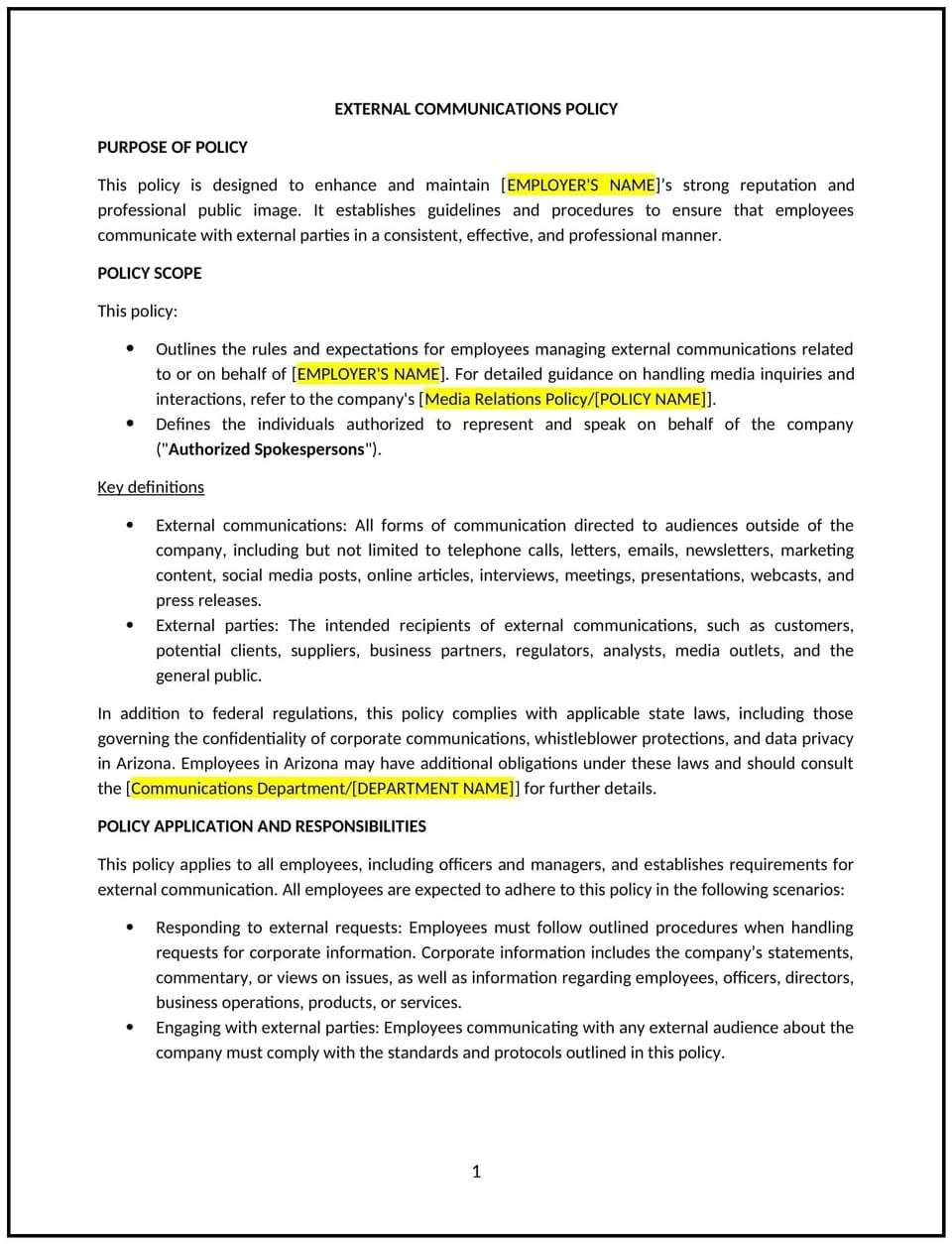External communications policy (Arizona): Free template

External communications policy (Arizona)
In Arizona, an external communications policy provides businesses with guidelines for managing interactions with external stakeholders, including clients, media, and the public. This policy ensures that all communications are consistent, professional, and aligned with the company’s goals and legal requirements.
This policy outlines the types of external communications, assigns responsibilities, and establishes procedures for handling media inquiries, public statements, and crisis communications. By implementing this policy, Arizona businesses can safeguard their reputation, promote clarity, and support compliance.
How to use this external communications policy (Arizona)
- Define approved channels: Specify which channels are authorized for external communications, such as official email, social media accounts, or press releases.
- Assign responsibilities: Identify the roles responsible for external communications, such as a public relations officer, marketing team, or leadership.
- Address media interactions: Provide procedures for responding to media inquiries, including designated spokespersons and approval processes.
- Include crisis communication protocols: Establish guidelines for addressing emergencies or public relations issues to ensure consistent and accurate messaging.
- Monitor compliance: Outline steps to ensure all external communications align with company policies, values, and legal obligations.
Benefits of using an external communications policy (Arizona)
This policy provides key advantages for Arizona businesses:
- Protects reputation: Ensures all external communications reflect the company’s professionalism and values.
- Supports compliance: Aligns with Arizona-specific laws and industry regulations, minimizing risks of legal disputes.
- Promotes consistency: Standardizes messaging across all external communication channels.
- Enhances efficiency: Streamlines communication processes, reducing the risk of errors or misinformation.
- Builds trust: Strengthens relationships with clients, partners, and the public by providing clear and accurate information.
Tips for using an external communications policy (Arizona)
- Address Arizona-specific considerations: Include provisions for industries like tourism, real estate, or healthcare that may require tailored communication strategies.
- Train employees: Provide training on external communication best practices and how to handle media inquiries or public statements.
- Use technology: Leverage tools to manage and monitor external communication channels, such as social media management platforms.
- Review regularly: Update the policy to reflect changes in communication technologies, laws, or organizational goals.
- Include social media guidelines: Address how employees should engage on social media when representing the company.
Q: Who is authorized to speak on behalf of the company under this policy?
A: Only designated spokespersons, such as the public relations officer or senior leadership, are authorized to represent the company in external communications.
Q: How should employees handle media inquiries?
A: Employees should refer all media inquiries to the designated spokesperson or public relations team, as outlined in the policy.
Q: What steps should businesses take during a crisis?
A: The policy should include a crisis communication plan that provides guidelines for preparing statements, coordinating with stakeholders, and addressing public concerns promptly and transparently.
Q: Can employees post about the company on personal social media accounts?
A: Employees may share company-related content if authorized, but they must avoid disclosing confidential information or making statements that conflict with company values.
Q: How does this policy support compliance with Arizona laws?
A: The policy aligns with Arizona’s legal and regulatory requirements, ensuring external communications meet industry standards and ethical guidelines.
This article contains general legal information and does not contain legal advice. Cobrief is not a law firm or a substitute for an attorney or law firm. The law is complex and changes often. For legal advice, please ask a lawyer.


